![]()
Chapter 1 What is practice?
Karen Elcock
NMC Standards of Proficiency for Registered Nurses
This chapter will address the following platforms and proficiencies:
Platform 1: Being an accountable professional
Registered nurses act in the best interests of people, putting them first and providing nursing care that is person-centred, safe and compassionate. They act professionally at all times and use their knowledge and experience to make evidence-based decisions about care. They communicate effectively, are role models for others, and are accountable for their actions. Registered nurses continually reflect on their practice and keep abreast of new and emerging developments in nursing, health and care.
At the point of registration, the registered nurse will be able to:
- 1.1 understand and act in accordance with The Code: Professional Standards of Practice and Behaviour for Nurses, Midwives and Nursing Associates, and fulfil all registration requirements.
- 1.2 understand and apply relevant legal, regulatory and governance requirements, policies, and ethical frameworks, including any mandatory reporting duties, to all areas of practice, differentiating where appropriate between the devolved legislatures of the United Kingdom.
- 1.13 demonstrate the skills and abilities required to develop, manage and maintain appropriate relationships with people, their families, carers and colleagues.
Chapter aims
After reading this chapter, you will be able to:
- appreciate why practice is an essential part of your programme;
- demonstrate an understanding of the regulatory requirements that govern your learning in practice;
- identify the key policies that are essential for safe practice;
- appreciate how skills and simulated learning are an important component of practice; and
- consider the differing expectations of the university and placement providers when you attend practice.
Introduction
There is little doubt that practice is, for most students, the ‘best part’ of their course. It makes up at least 50 per cent of a pre-registration nursing programme, which demonstrates its importance in preparing you to become a registered nurse. It is this balance between theory and practice that makes a nursing course very attractive to many students. It offers the opportunity to apply the theory learnt in university to the real world of practice and also bring the learning from practice back to university to inform class seminars, discussions and assignments. One of the challenges with learning in practice is that it is inevitably very messy and unpredictable. At university, you will have a timetable with scheduled classes that will develop your knowledge incrementally across the programme. Practice is far less predictable, and you will come across things you have not yet learnt at university. This will require you to undertake additional research and reading alongside your course activities to help you make sense of what you see. In addition, you will be faced with situations that will challenge you both emotionally and intellectually as well as situations that will provide you with memories that will stay with you forever. However, you will not make this journey alone, and there will always be support available to you both in practice and at university from a range of staff. We will look at these people later in the book.
This chapter sets the scene for many of the chapters later in this book. It looks at why practice (both out on placement and in the clinical skills laboratory) is such an important part of your programme. Practice is essential in developing the skills and knowledge you need to meet the requirements set by the Nursing and Midwifery Council (NMC) and so register as a nurse at the end of your programme. Much of the way learning in practice is organised and structured is governed by the NMC education and programme standards (NMC, 2018b, 2018c, 2018d), and so we will look at their requirements to help you understand why your university has some rules and regulations around practice that are non-negotiable. The NMC exists to protect the public, and so in addition to their standards, which inform the development of your programme, there are also a number of additional standards, guidelines and policies published by them to ensure safe practice and also to ensure you stay within the law. Some of these are key for practice, so we will explore them, why they are important and what they mean for your practice. We will end the chapter by considering the expectations of both the university and practice partners, who provide your placements during your course.
What do we mean by practice?
Practice relates to both the placements that you will be allocated to and to the learning that takes place in skills and simulation suites or laboratories (often called skills labs). Placements are provided by practice learning partners, who have a joint responsibility with the university to ensure the quality of your programme.
Activity 1.1 Evidence-based practice
You may have selected your university based on where you will have an opportunity to undertake your placements, or you may not have considered this as important as the university itself.
Do you know who all the practice partners at your university are that will be providing placements for you, and so where you may potentially be allocated to? If you are unsure, check the university website or the information on practice placements your university has provided you with.
As this activity is based on your own observation, there is no outline answer at the end of the chapter.
Depending on your reasons for choosing your university and the research you undertook to find out about the placement partners it works with, Activity 1.1 may or may not have provided some surprises for you. Regardless, the types of placements you will gain experience in are varied. They include hospitals, community and primary care trusts, GP practices, the independent, charity and voluntary sectors, integrated health and social care settings, schools and colleges, and nursing and residential care homes (RCN, 2017a). Both placements and skills and simulation suites provide students with a range of practice learning opportunities that are designed to:
allow students to develop and meet the Standards of proficiency for registered nurses to deliver safe and effective care to a diverse range of people across the four fields of nursing practice.
(NMC, 2018d, p10)
Practice provides you with the opportunity to learn the skills that will be essential to you as you progress on your course and in your career as a nurse. However, it is not just about learning practical skills; practice also offers you the opportunity to apply the theory learnt in university to the real world of practice and develop your professional identity as a nurse. The importance of placements to students is described by Jenni Middleton, the editor of Nursing Times, when she says:
Students tell us over and over again that their placement is one of the most important aspects of their training. A positive placement experience will not only teach good practice but will also coach students in how to develop relationships with their peers and patients.
(J. Middleton, 2017)
Figure 1.1 The 6Cs
Source: Department of Health and NHS Commissioning Board (2012). Reproduced with permission under the Open Government Licence
Developing (professional) relationships with your peers (students and other registered healthcare professionals) and patients and their carers is important in developing your professional identity. These relationships form part of the professional socialisation process of learning the skills, attitudes, values and behaviours required to become a nurse (Maginnis, 2018). Role models, particularly in practice, are highly influential in the development of the professional traits required in students. During your time in practice and in university, you will not only learn the skills and knowledge required, but more importantly acquire and develop the professional values and behaviours required of a nurse.
In 2012, Compassion in Practice was published, which identified six values and behaviours that are seen as fundamental to, and should underpin, all care wherever it takes place. These six values and behaviours have become known as the 6Cs (Department of Health and NHS Commissioning Board, 2012) and are shown in Figure 1.1. You will find the 6Cs are a significant part of your nursing curriculum, be it in class, in the skills lab or within your Practice Assessment Document, as there is an expectation that they underpin everything you do as a nurse.
The role of skills and simulation in practice learning
Skills and simulation are an important part of your practice learning. These may be delivered in blocks or as a regular event on a defined day each week. Either way, you will find they run throughout the length of your programme.
The NMC defines simulation as:
An artificial representation of a real world practice scenario that supports student development through experiential learning with the opportunity for repetition, feedback, evaluation and reflection. Effective simulation facilitates safety by enhancing knowledge, behaviours and skills.
(NMC, 2018d, p18)
While the NMC describes it as an artificial representation, the technology that is now available means that the simulations can feel very real. For example, high-fidelity simulations use computerised mannequins that can be programmed to demonstrate a wide range of patient conditions and clinical signs, which can change depending on how you respond to their needs. It is not just about technology, however; many universities now use role players who play the part of a patient, service user, carer or child within a defined scenario. Role players offer students a more realistic element to their learning, and in particular a more genuine experience of what it is like to communicate with the individual. After the simulation, the student can receive honest feedback on what it was like for the role player in being cared for by the student and the quality of the student’s communication and demonstration of empathy and compassion. You will find your university uses a wide range of approaches to simulation; Table 1.1 lists some you may come across.
Simulation is used to prepare students for clinical practice – for example, teaching core clinical nursing skills such as handwashing, taking clinical observations (pulse, respiratory rate, blood pr...


